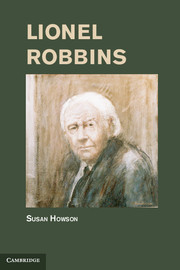Book contents
- Frontmatter
- Contents
- Illustrations
- Abbreviations
- Introduction
- One Father and Son
- Two The Great War
- Three Postwar
- Four The London School of Economics
- Five Iris Gardiner
- Six New College Oxford
- Seven The Young Professor
- Eight Fritz and Lionel
- Nine The School in the Mid-1930s
- Ten The Approach of War
- Eleven The Economics of War
- Twelve Director of the Economic Section
- Thirteen Anglo-American Conversations
- Fourteen The Law Mission and the Steering Committee
- Fifteen 1 9 4 4
- Sixteen The Last Months of the War
- Seventeen The Postwar Settlement
- Eighteen Return to the School
- Nineteen The End of the Transition
- Twenty LSE in the Early 1950s
- Twenty-One Chairman of the National Gallery
- Twenty-two Lord Robbins
- Twenty-three The Robbins Report
- Twenty-four The Sixties
- Twenty-five The Arts
- Twenty-six The Troubles at LSE
- Twenty-seven Retirement
- Conclusion
- Bibliography
- Index
Fifteen - 1 9 4 4
Published online by Cambridge University Press: 07 October 2011
- Frontmatter
- Contents
- Illustrations
- Abbreviations
- Introduction
- One Father and Son
- Two The Great War
- Three Postwar
- Four The London School of Economics
- Five Iris Gardiner
- Six New College Oxford
- Seven The Young Professor
- Eight Fritz and Lionel
- Nine The School in the Mid-1930s
- Ten The Approach of War
- Eleven The Economics of War
- Twelve Director of the Economic Section
- Thirteen Anglo-American Conversations
- Fourteen The Law Mission and the Steering Committee
- Fifteen 1 9 4 4
- Sixteen The Last Months of the War
- Seventeen The Postwar Settlement
- Eighteen Return to the School
- Nineteen The End of the Transition
- Twenty LSE in the Early 1950s
- Twenty-One Chairman of the National Gallery
- Twenty-two Lord Robbins
- Twenty-three The Robbins Report
- Twenty-four The Sixties
- Twenty-five The Arts
- Twenty-six The Troubles at LSE
- Twenty-seven Retirement
- Conclusion
- Bibliography
- Index
Summary
To his too coy colleagues
Had we but world enough, and time,
This slowness, gentles, were no crime.
We might consume each livelong day
Discussing how can debtors pay.
John Maynard should delight our wits
Describing how each project fits.
James Meade should still expound the laws
of economics, clause by clause
Stout Melville might his land defend
Demanding what the world shall lend.
Mackintosh’ speech would slowly burn
Into our hearts his great concern
For all that helps to foster trade.
McCarthy'd call a spade a spade.
From Clauson and Sir David Meek
We'd cynically learn to speak
In praise of regulation schemes,
Which Dennis Robertson just deems
The deuce. Such talks could last no doubt
For two years more or thereabout.
But at my back I always hear
Joe Stalin’s cohorts thundering near.
We can't expect the war to last
Till all our problems are o'er past.
The other nations may complain
That we had racked our brains in vain.
We do not wish to leave to Joe
Decisions on the way we go.
By the end of 1943 the Allies had determined on an invasion of France (Operation Overlord) in the spring of 1944. Although its exact time and place could not be known, it could be roughly predicted given the need for suitable weather and tides. Assuming it was successful, the war in Europe could end in 1944. In January Allied efforts in Italy, which had been making slow progress since the invasion of Sicily in July 1943, intensified with the landing of British and American forces at Anzio. In Russia the siege of Leningrad was lifted on 25 January. But the Luftwaffe returned to bomb London nightly; and even before the ‘little Blitz’ there was the threat of new weapons that Hitler was planning to launch on London: Lionel discouraged his children from visiting London during the Christmas holidays without telling them the reason (Sansom 1947, 176–83; LCR to IER, 9 July 1944).
- Type
- Chapter
- Information
- Lionel Robbins , pp. 495 - 552Publisher: Cambridge University PressPrint publication year: 2011

